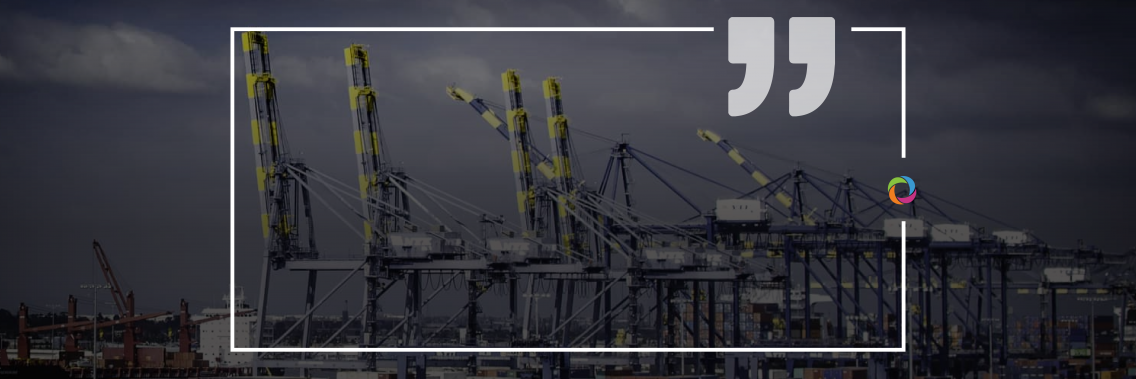Global trade recorded a 5% drop in the third quarter of 2020 compared to the same period the previous year, according to the United Nations Conference on Trade and Development (UNCTAD). The organization states that international trade in goods is expected to continue to nosedive in the coming months as economies struggle to recover from the lockdown measures adopted to slow the spread of the COVID-19 outbreak. Will this affect developing countries the most and what should be done in this regard? Read some answers below.
How does the collapse of global trade affect developing countries?

“The economic impacts of the global recession and the measures taken by country authorities around the world to contain the rapid spread of the COVID-19 pandemic have been severe for developing countries. Not only has international trade taken a nosedive, cutting into the international reserve buffers of developing countries, but sharp declines in travel, tourism, and remittance inflows have diminished their foreign exchange earnings capacity. This, coupled with massive capital outflows, is eroding the fiscal space of many developing countries, pushing them closer to the middle-income country debt trap that could erase decades of development progress.”

“Whilst the WTO projects a 2021 recovery in international trade from a 2020 COVID19-induced slump, there are no easy policy solutions for an industrializing economy that wants to increase its export capabilities. Globalization has relied upon international supply chains that meet regulatory standards and logistical efficiency at the optimal cost through global value chains. However, the key to benefitting from the projected recovery is a recognition that these existing patterns of trade are going to change, as consumers expect more resilient supply chains, supported by suppliers from within a region close to the major market.”

“COVID triggered an L shaped global recession that has had a profound effect globally and which will continue to impact economies for years to come. Much like developed economies, developing countries are in the midst of fiscal and market contraction-recalibration to withstand the daunting effects. Global trade, which initially experienced a near collapse and gridlock, now tends to be emerging from the ventilator. This entails a better balance of payments for Q3&4 for 2020. Developing and Least Developed countries (LDCs) continue to be the recipients of G-20 and multilateral donor generosity which to some extent offsets the brunt of the economic/trade downturn.”

“International trade has been badly affected by the COVID-19 pandemic. This is particularly damaging for developing countries for the following reasons: 1) These countries are more dependent on international trade because of their limited production capacity, hence the reliance on imports. On the other hand, the main feature of their economy is, in most cases, a single production line which consists of exporting mineral or unprocessed products to receive currencies which allow them to cover the cost of their imports and achieve a trade balance. This situation is bound to limit their investment and their economic growth. 2) The poorer segment of the population will suffer from the consequences. Imports will be limited and the price of commodities will go up for a population with limited resources and savings.”

“Despite the fact that there was a rebound in global trade during Q3 2020, the trends remain negative and, from today’s perspective, this is all the more so with stringent lockdown measures and the “strong” spread of pandemics worldwide. It could be expected that the negative trend in world trade will continue throughout Q1 2021. Developing countries suffer in a different way which may be less volatile but is strongly inclined towards negative trends. Here, in Bosnia and Herzegovina, we have the cumulative effect of a double-digit decrease in both exports and imports throughout 2020, and we don’t see this reversing anytime soon (a 12% decrease in exports and a 15% decrease in imports). While Bosnia is tied to EU in its foreign trade (69%), like many developing countries in the region, I believe that, considering the spread of the virus, only South Asian economies will have better outcomes. As the stringent measures killed several service sectors, choking, at the same time, value chains downstream, the flow of commodities, except for medical supplies, could be in free fall any time soon. This situation is particularly dangerous for the economies of developing countries as they don’t have many macroeconomic tools to hand to cope with the situation. Increased health costs and a shrinking economy and increasing debt burden will produce long term negative effects, so no easy rebound should be expected.”

“Transport networks (roads, trains) between African nations or between the ports and landlocked hinterlands are the basic continental sticking points. Africa will be the first affected by the future global scarcity of oil and the continent also lacks a massive industrial sector. These factors will have a greater long-term effect on development and trade in Africa than the current consequences of COVID-19. Many years ago, the northern (or “western”) countries discarded a major nascent solution, which would have led to a conflict between their main economic sectors, thus blocking the possibilities of scale effects, allowing themselves only niche markets. These sectors are not prone to major competitive strife between themselves providing their business areas are not directly involved.”

“Any slowdown in the growth of advanced countries, a downward trend in their investment activities, a decrease in the volume of international trade, directly affects the economic growth rate of developing countries, decreasing the prospects of an improvement in economic development.”

“If we talk about the Kyrgyz Republic, the COVID-19 pandemic has disastrously affected the internal and inter-country movement of goods. At the beginning of the lockdown, when the borders were completely closed, the country, with the exception of food products, stopped receiving all other goods and services. The entire value-added chain was interrupted. Subsequently, despite the relative decrease in the incidence, the country’s main trading partner, China, has still not fully open its borders. This, in turn, leads to stagnation in the trade export-import operations of the Kyrgyz Republic. The lack of opportunities to carry out active economic transactions, in turn, affects the general political and economic situation in the Kyrgyz Republic.”
What should the international community do to mitigate the impact?

“Concerted policy efforts and multilateral cooperation are essential to mitigate these negative impacts, avoid further global contraction, instill confidence and support the flow of international trade and investment. Building the resilience of supply chains would further help a global economic recovery. Most importantly, stronger support for a rules-based trading system, with the World Trade Organization (WTO) at the center, is important for the future growth prospects of developing countries.”

“Participation in regional supply chains represents an opportunity for industrializing countries to increase exports. This will require enhanced institutional capacity, supporting enterprises to cater for a region’s prime consumer products and service regulations. The international community should continue to use bilateral and multilateral trade agreements and technical assistance cooperation to force the achievement of coordinated new laws and regulations that upgrade enterprise-supporting institutions and human resources. This work should be supported by a strategic framework that meets the economic, social and environmental long term objectives of governments and private sectors that will also enhance SME participation in the domestic economy and attract more investment.”

“The recalibration of supply and demand structures will allow localization of goods and service. However, it is likely to create partnerships of two economic unequals (bilateral) and regional trading blocs resulting in costs. Mitigation of this is possibly to create synergies for production/manufacturing factors alongside the transfer of technical skills for a reasonable priced product for global consumption. Overheated economies (namely BRICs) would also address non-indigenous value addition inputs and have a pollination effect for the next fiscal term to come.”

“The international community can increase its cooperation, assistance and technical aid for these developing countries. However, the challenge will be to promote a new international cooperation based on quality and closer to the population in need of assistance. Also, engagement is needed in promoting new policies to diversify the economy and also to combat fraud, corruption and other hurdles which are hampering the development of these countries to reach a higher stage of development.”

“I would strongly recommend that mitigation measures should immediately take into account the immunization problems for developing countries. In my view, it would be more feasible and less costly than massive economic revival packages that would combine a huge inflow of funds and debt relief. The latter will be needed but could be less onerous if we act urgently on both fronts.”

“International communities must apply their old know-how, updated with GPS, artificial intelligence, and digitization, and totally change the way freight and trade is designed in Africa.”

“The integrated approach of fiscal, monetary and trade policies in the stimulation of consumption and investments is the only alternative to coping with recession trends by national states. The fiscal policy should be expansive with reduced tax burdens, particularly income tax, allowing the business sector access to certain funds for investment and enabling the preservation of jobs for the working population. In addition, a decrease in tariffs and import restrictions could contribute to a weaker deceleration of international trade, preventing bankruptcies and enormous job losses. However, public spending should be reduced in order to keep enough space for private sector investments. Long-term public projects should be postponed and if there are any projects, public investments should be short-term with immediate economic effects. The measures of economic policy need to be multidimensional and coordinated focusing on the sustainability of economic sectors and the liquidity of households. Nevertheless, national resources will not be enough for developing countries to support the existence of the private sector and prevent an increase in unemployment without the support of international financial organizations.”

“To mitigate, first and foremost, all countries should start an open-door policy and a “trust” policy. In the case of the Kyrgyz Republic, the closure of borders from both China and the Republic of Kazakhstan has led to a de facto blockade of our country. Therefore, only good-neighborly relations between neighboring countries can influence the start of economic activity.”
Check out more than 60 job opportunities in the trade sector here.

